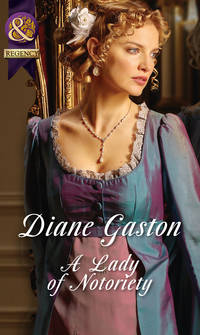
A Lady of Notoriety
‘A cane, sir? Forgive me, sir, I had not noticed you walking with any difficulty.’ His voice was distressed.
‘No difficulty,’ Hugh assured him. ‘I merely thought that if I had a cane, I could keep myself from bumping into things. I could walk around without assistance.’
‘I see, sir.’ The man cleared his throat. ‘I will look for a cane for you.’
Carter closed the door and Hugh drummed his fingers on his knee. What the devil was he going to do to pass the time?
He rose and explored the room, treading carefully and trying not to tumble over furniture or break priceless ornaments.
It was a modest drawing room. He found at least three separate seating groups and some cabinetry along the walls. One of the cabinets held the claret. He was tempted to pour himself a glass, but feared he would spill the liquid and stain the carpet. He could drink from the carafe, but that seemed too ill mannered. Besides, he’d just consumed breakfast. It was a little early for imbibing.
He continued through the room and along the wall until finding a window. He knew from opening his window before breakfast that the day was a chilly one for April and to open this one would defeat the fire’s battle to warm the room, but he could not resist. The fresh air smelled like freedom.
He took in big gulps of air, as hungry for it as he’d been for his first meal here. But he closed the window again. Nothing was more of a nuisance than a guest who took over and changed a household’s entire routine. He was just so extremely tired of being closed inside walls.
But that was his lot for the moment. He ought, at least, to bear it without this constant pitying of himself.
He continued his way around the room.
He found a pianoforte in one corner of the room and ran his fingers down the keys. He pressed one. It sounded a note.
And reminded him of his sister.
How was Phillipa faring? he wondered. Was she still spending long hours at the pianoforte, composing those songs of hers? Was her husband still selling her music? Hugh had heard one of the songs played by the orchestra at Vauxhall Gardens, quite an unusual accomplishment for a well-bred young lady.
Phillipa followed her own desires, no matter the pressure from their mother and the neglect of her father and brothers. Look at the result. She’d married Xavier—a man decent enough to put the whole Westleigh family to shame and well able to provide for her. And she’d just become a mother.
Hugh hoped Phillipa still played music, even though she was now a mother. He’d never given her music much thought—if truth be told, he never gave Phillipa enough thought. With her scarred face, she’d always hidden herself away. And she was seven years younger. He’d been at school, then in the army while she grew up.
He admired her now.
Phillipa’s scar, her music, the abominable way everyone had treated her, all freed her from any responsibility to the family. Ned, now the earl, was charged with preserving the family property and good name for coming generations. Hugh had been given the task of family workhorse.
Difficulties emerged at the country estate? Send Hugh to fix them. Papa engaging in bad behaviour again? Dispatch Hugh to set him straight.
All that was at an end. Ned must attend to his property now and their father would no longer trouble anyone. Hugh was free.
Or would be, if his sight returned.
He made a fist and struck the keys of the pianoforte again. The sound was as discordant as his emotions. His freedom was dependent upon his eyes. What if they did not heal?
He straightened. Enough self-pity.
He drummed his fingers on the keyboard and made more pleasant music.
For want of anything else to do, he sat at the pianoforte’s bench and felt the keys, hearing his sister’s endless scales that echoed through their house for so many years. He found middle C and played the simple C scale, which pretty much exhausted his knowledge of playing.
He played the scale again. And again. And again until his fingers moved smoothly from note to note and the novelty wore off. He tried picking out a tune, an exercise in trial and error, but he kept at it.
He picked out the tune for the military bugle call that signalled the end of the day—or the end of battle.
Конец ознакомительного фрагмента.
Текст предоставлен ООО «ЛитРес».
Прочитайте эту книгу целиком, купив полную легальную версию на ЛитРес.
Безопасно оплатить книгу можно банковской картой Visa, MasterCard, Maestro, со счета мобильного телефона, с платежного терминала, в салоне МТС или Связной, через PayPal, WebMoney, Яндекс.Деньги, QIWI Кошелек, бонусными картами или другим удобным Вам способом.
Вы ознакомились с фрагментом книги.
Для бесплатного чтения открыта только часть текста.
Приобретайте полный текст книги у нашего партнера:
Всего 10 форматов

